|
|
|
Sort Order |
|
|
|
Items / Page
|
|
|
|
|
|
|
| Srl | Item |
| 1 |
ID:
098217
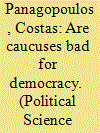

|
|
|
| 2 |
ID:
143296
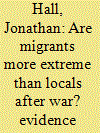

|
|
|
|
|
| Summary/Abstract |
Little is known about the attitudes of migrant populations originating from countries affected by conflict. This article examines a key assumption in the literature: that migrants harbor more conflictive attitudes than locals after war. Until now, we simply lacked the micro-level data necessary to examine migrant attitudes directly. Rather than relying on indirect evidence, I analyze new data from simultaneous surveys conducted in Sweden and Bosnia in 2010. As a whole, the empirical analysis supports the article’s novel theoretical approach. Under certain conditions, migration may promote inclusive and reconciliatory attitudes by improving access to coping resources and providing an exit from detrimental wartime and postwar conditions in origins countries.
|
|
|
|
|
|
|
|
|
|
|
|
|
|
|
|
| 3 |
ID:
144546
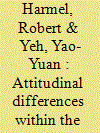

|
|
|
|
|
| Summary/Abstract |
This study addresses whether individuals who were sent down during the Cultural Revolution reveal different political attitudes from those who were socialized during the same period but were not themselves sent down. Using data from the urban sample of the 2006 General Social Survey of China, the authors find evidence that formerly sent-down youth – and particularly sent-down women – as compared to their not-sent-down peers, are today more willing to accept the class-struggle foundation of Mao's communist ideology but are, at the same time, more willing to assess the performance and structure of the communist regime critically.
|
|
|
|
|
|
|
|
|
|
|
|
|
|
|
|
| 4 |
ID:
117585
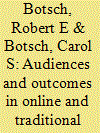

|
|
|
|
|
| Publication |
2012.
|
| Summary/Abstract |
In 1997 we first offered American government classes online as well as face-to-face classes. We administered pre- and posttests to our students to measure their general knowledge of American government, political attitudes, demographics, and some behaviors. Following an initial report in 2001, we continued to gather data for 10 more years; this current study covers nearly 3,200 students during 13 years. We examine the sample as a whole and changes in audiences and outcomes, over time, for the two teaching formats. Although the kinds of students taking online classes have become more similar, a few differences persist. Learning outcome differences continue to be insignificant. Neither format has a clear advantage in students' changes in attitudes, but the online classes increased students' newspaper reading. Class dropout rate and faculty workload both favor face-to-face classes, but flexibility in scheduling and student demand clearly favor online classes.
|
|
|
|
|
|
|
|
|
|
|
|
|
|
|
|
| 5 |
ID:
171689
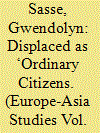

|
|
|
|
|
| Summary/Abstract |
Based on original survey data, this essay analyses the political attitudes of individuals displaced by the war in eastern Ukraine. We systematically compare attitudinal differences and similarities along three axes: the displaced relative to the resident population; the displaced in Ukraine relative to the displaced in Russia; and the displaced from the (non-)government-controlled areas relative to the resident population in the (non-)government-controlled areas of Donbas. This fine-grained comparative analysis highlights the variety of attitudes held by the displaced, similarities in attitudes across displacement locations, and the effect of war casualties on attitudes and self-declared political interest.
|
|
|
|
|
|
|
|
|
|
|
|
|
|
|
|
| 6 |
ID:
187669
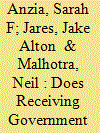

|
|
|
|
|
| Summary/Abstract |
When individuals receive benefits from government programs, does it affect their attitudes toward those programs or toward government generally? A growing literature blends policy feedback theory and political behavior research to explore these questions, but so far it has focused almost exclusively on social policies such as the Affordable Care Act. In this article, we focus on a very different set of government programs that reach a more conservative, rural population: agricultural assistance. Our study ties administrative records on participation in USDA farm aid programs to an original, first-of-its-kind survey measuring agricultural producers’ political attitudes. We find that receiving agricultural assistance is sometimes related to producers’ views of the program delivering the benefits, but it depends on the divisiveness of the program and—for highly partisan programs—recipients’ ideology. However, receiving federal agricultural assistance is not associated with more positive views of government.
|
|
|
|
|
|
|
|
|
|
|
|
|
|
|
|
| 7 |
ID:
192080
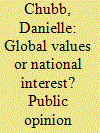

|
|
|
|
|
| Summary/Abstract |
This article examines Australian attitudes towards foreign aid and the intersection of these attitudes with broader debates around the purpose and level of the aid program. Drawing on surveys conducted over six decades, we show that the public broadly supports the principle of foreign aid, but are much less supportive of aid expenditure, especially judged against other areas of government spending. Using the 2022 Lowy Poll, we test four hypotheses to explain public support for foreign aid. The results show that both values and interests shape the public’s views of foreign aid spending. The challenge for policymakers is to craft messages about foreign aid which present aid expenditure as being relevant to both the values and interests relevant to the lives of everyday Australians.
|
|
|
|
|
|
|
|
|
|
|
|
|
|
|
|
| 8 |
ID:
183004
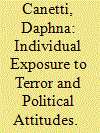

|
|
|
|
|
| Summary/Abstract |
How does exposure to terrorism affect political attitudes? This paper presents a new individual-level psychobiological model of political attitudes. Using a unique individual-level data of personal exposure to terrorism, a physiological marker of inflammation (CRP) and a psychological measure of perception of threat to an ongoing conflict—the Israel-Palestinian Conflict—we assess the effect of personal exposure to terrorism on militant attitudes concerning the conflict. Our data of physiological (blood samples), psychological, and attitudinal factors were collected in Israel during a military escalation along the Gaza Strip border. The findings reveal that among people personally exposed to terrorism, the perception of threat mediates an association between physiological conditions and militant attitudes. These findings contribute to the emerging literature on the biopolitics of political violence, suggesting a renewed focus on the dynamic interplay between physiological, psychological, and political factors.
|
|
|
|
|
|
|
|
|
|
|
|
|
|
|
|
| 9 |
ID:
132938
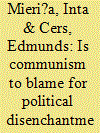

|
|
|
|
|
| Publication |
2014.
|
| Summary/Abstract |
In this article, we apply a new, original technique of cohort analysis to test empirically whether political disenchantment in the post-communist countries of Central and Eastern Europe can be linked to the previous political culture. On the basis of International Social Survey Programme 1996 and 2006 data we find a surprisingly similar and unique cohort effect in all analysed post-communist countries, reflecting persistent generational differences in perceived political competence (interest and understanding of political processes). However, the communist legacy does not seem to be important for explaining low self-efficacy or distrust in political authorities and their responsiveness to citizens' demands.
|
|
|
|
|
|
|
|
|
|
|
|
|
|
|
|
| 10 |
ID:
167163
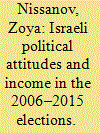

|
|
|
|
|
| Summary/Abstract |
It is commonly assumed that in Israel, higher income groups tend to hold more liberal views and vote for center-left parties while poorer segments of the population support rightwing parties. This article analyzes political attitudes and voting in four parliamentary elections by income groups, using the European Social Survey (ESS) data. By relying on transition matrices and mobility analysis, the article examines which income group is more loyal to the parties and political blocs. The results suggest that the percentage of rightwing voters within all classes is higher than that of leftwing voters. In addition, the poorest individuals are the most loyal voters while the richest are the most likely to switch parties and blocs. Finally, logit estimation shows that rightwing and ultra-orthodox voters are more likely to remain loyal to parties.
|
|
|
|
|
|
|
|
|
|
|
|
|
|
|
|
| 11 |
ID:
162660
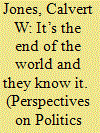

|
|
|
|
|
| Summary/Abstract |
Given that the fictional narratives found in novels, movies, and television shows enjoy wide public consumption, memorably convey information, minimize counter-arguing, and often emphasize politically-relevant themes, we argue that greater scholarly attention must be paid to theorizing and measuring how fiction affects political attitudes. We argue for a genre-based approach for studying fiction effects, and apply it to the popular dystopian genre. Results across three experiments are striking: we find consistent evidence that dystopian narratives enhance the willingness to justify radical—especially violent—forms of political action. Yet we find no evidence for the conventional wisdom that they reduce political trust and efficacy, illustrating that fiction’s effects may not be what they seem and underscoring the need for political scientists to take fiction seriously.
|
|
|
|
|
|
|
|
|
|
|
|
|
|
|
|
| 12 |
ID:
088415
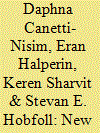

|
|
|
|
|
| Publication |
2009.
|
| Summary/Abstract |
Does exposure to terrorism lead to hostility toward minorities? Drawing on theories from clinical and social psychology, we propose a stress-based model of political extremism in which psychological distress-which is largely overlooked in political scholarship-and threat perceptions mediate the relationship between exposure to terrorism and attitudes toward minorities. To test the model, a representative sample of 469 Israeli Jewish respondents was interviewed on three occasions at six-month intervals. Structural Equation Modeling indicated that exposure to terrorism predicted psychological distress (t1), which predicted perceived threat from Palestinian citizens of Israel (t2), which, in turn, predicted exclusionist attitudes toward Palestinian citizens of Israel (t3). These findings provide solid evidence and a mechanism for the hypothesis that terrorism introduces nondemocratic attitudes threatening minority rights. It suggests that psychological distress plays an important role in political decision making and should be incorporated in models drawing upon political psychology.
|
|
|
|
|
|
|
|
|
|
|
|
|
|
|
|
| 13 |
ID:
147657
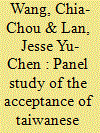

|
|
|
|
|
| Summary/Abstract |
Chinese students studying in Taiwan provide a possible approach for Taiwan to overcome international position dilemmas. Regarding changes in participants’ acceptance of Taiwanese international participation, we found that 43.75% exhibited increased acceptance. The regression model employed in this research explained 26.36% of the variance.
|
|
|
|
|
|
|
|
|
|
|
|
|
|
|
|
| 14 |
ID:
099289
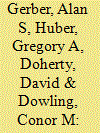

|
|
|
|
|
| Publication |
2010.
|
| Summary/Abstract |
Previous research on personality traits and political attitudes has largely focused on the direct relationships between traits and ideological self-placement. There are theoretical reasons, however, to suspect that the relationships between personality traits and political attitudes (1) vary across issue domains and (2) depend on contextual factors that affect the meaning of political stimuli. In this study, we provide an explicit theoretical framework for formulating hypotheses about these differential effects. We then leverage the power of an unusually large national survey of registered voters to examine how the relationships between Big Five personality traits and political attitudes differ across issue domains and social contexts (as defined by racial groups). We confirm some important previous findings regarding personality and political ideology, find clear evidence that Big Five traits affect economic and social attitudes differently, show that the effect of Big Five traits is often as large as that of education or income in predicting ideology, and demonstrate that the relationships between Big Five traits and ideology vary substantially between white and black respondents.
|
|
|
|
|
|
|
|
|
|
|
|
|
|
|
|
| 15 |
ID:
103362
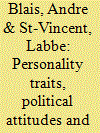

|
|
|
|
|
| Publication |
2011.
|
| Summary/Abstract |
This article examines the link between personality traits, political attitudes and the propensity to vote in elections, using an Internet panel survey conducted in two Canadian provinces at the time of the 2008 federal election and the subsequent provincial elections. It first establishes that the two most proximate attitudes that shape one's propensity to vote are political interest and sense of civic duty. The article then look at specific personality traits (altruism, shyness, efficacy and conflict avoidance) that could affect level of political interest, civic duty and the propensity to vote in elections. In the last part of the analysis, a model is proposed and tested, according to which the impact of personality traits is indirect, being mediated by interest and duty. The article shows that the data are consistent with such an interpretation.
|
|
|
|
|
|
|
|
|
|
|
|
|
|
|
|
| 16 |
ID:
151019
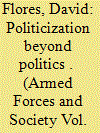

|
|
|
|
|
| Summary/Abstract |
There is growing interest in the implications of military service for the political attitudes, behaviors, and activism of military veterans. This article considers how promission and antiwar veterans’ narrate their experiences of becoming political activists and the mechanisms that effect that transition. The research draws on narratives from 40 members of the antiwar organization Iraq Veterans against the War and 28 members of the promission organization Vets for Freedom. Using “exemplars” from opposing political groups, the article reveals the shared process of politicization for both groups of veterans, and how divergent promission and antiwar definitions of duty, service, patriotism, and narratives of experiences and interpretations of warfare activate meaning-making activities, mechanisms, and analytical frames that share more in common than surface political differences might suggest.
|
|
|
|
|
|
|
|
|
|
|
|
|
|
|
|
| 17 |
ID:
149477
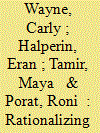

|
|
|
|
|
| Summary/Abstract |
How does accountability impact political decisions? Though previous research on accountability has demonstrated its potential effects in the realms of business, elections, and more, very little research has explored the effect of citizen accountability in highly ideological, intractable, and political conflicts. This article addresses this issue, looking at the unique interaction between accountability and ideology on Israeli citizens’ political attitudes regarding the Israeli–Palestinian conflict. The results of two experimental studies in Israel reveal that accountable individuals behave in significantly more ideologically partisan ways than their nonaccountable counterparts. Moreover, this polarization is dependent on the specific conflict context, with leftists more affected by the issue of negotiations and rightists by security concerns. This signals that ideological polarization under accountability may depend on the “issue ownership” each ideological group feels toward the specific conflict context and its corresponding social goal of projecting ideological consistency on these issues.
|
|
|
|
|
|
|
|
|
|
|
|
|
|
|
|
| 18 |
ID:
178583
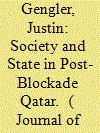

|
|
|
|
|
| Summary/Abstract |
This article examines key questions of citizen-state, citizen-citizen, and citizen-expatriate relations in the Arab Gulf states through the lens of the 2017 Qatar blockade. It utilizes original public opinion survey data that allow examination of the embargo’s short-term impacts on social and political relations in Qatar as well as broader trends observed over the period from 2010 to 2019. Results lend support to some existing qualitative accounts suggesting changes in important social and political dynamics in Qatar after the blockade. However, survey data also show that such post-blockade differences are mostly reflections of larger attitudinal shifts witnessed over the course of the past decade, rather than isolated effects of the GCC crisis. This suggests the possibility that other Gulf Arab states are experiencing similar transformations in popular sociopolitical orientations and behavior brought on by the same long-term drivers.
|
|
|
|
|
|
|
|
|
|
|
|
|
|
|
|
| 19 |
ID:
187732
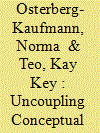

|
|
|
|
|
| Summary/Abstract |
Democracy is subject to constant and seemingly interminable contestation in academic and policy contexts, and yet, empirically and methodologically robust analysis of what the term means in practice for actual citizens has remained an area of relative lacuna. Admittedly, large-N surveys have attempted to address this research gap by examining attitudes to numerous components of democracy, but without the fine-grained detail required to overcome simply reproducing the focus on liberal procedural, Western precedent-based, top-down approaches to understanding such a complex and varied political system. This article proposes a methodological approach, based on the requirements of comparative political theory and research into how people view democracy. This allows us to explore political attitudes and the meaning of democracy with a bottom-up approach using the methods of repertory grid and in-depth interviews. Singapore is a particularly exciting case for comparative political science: although it has all the advantageous conditions that, according to classic modernization theory, promote the development of democracy, it is still not a democracy.
|
|
|
|
|
|
|
|
|
|
|
|
|
|
|
|
|
|
|
|
|